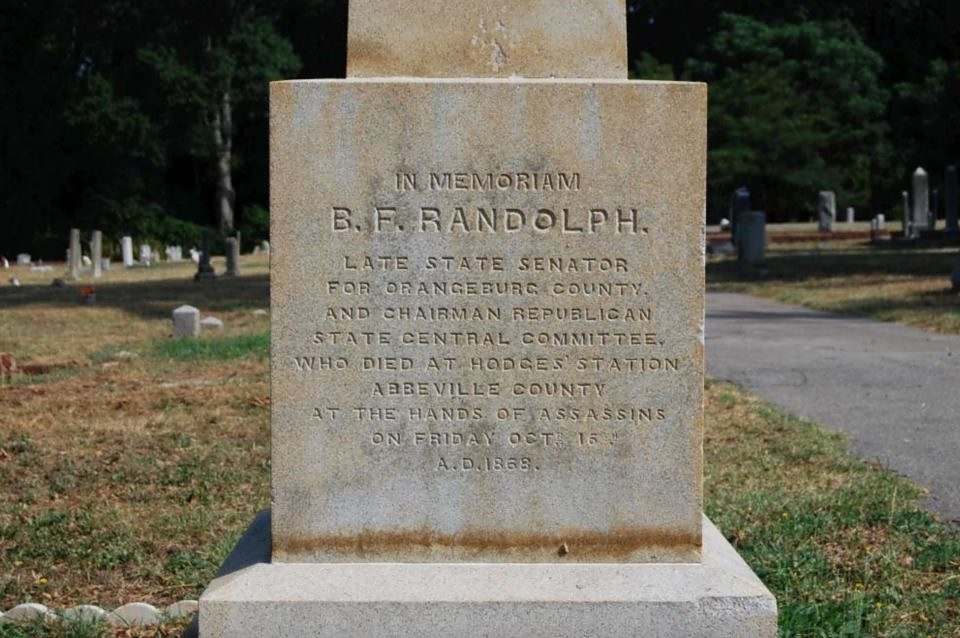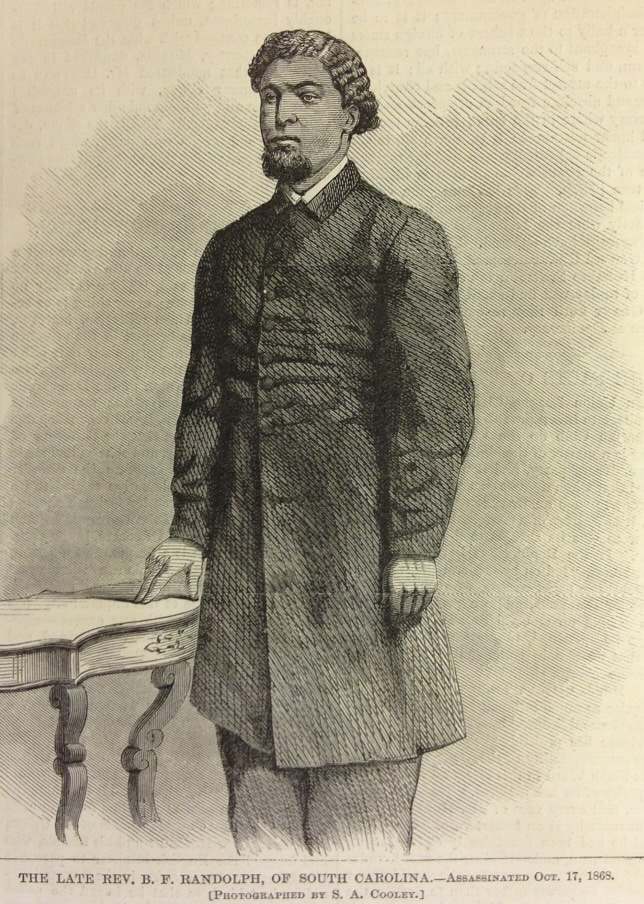|
Getting your Trinity Audio player ready...
|
Passengers began rounding up their belongings as the little engine chugged into the station in Hodges, South Carolina on that Indian summer Friday. One of them had no idea he was about to step out of the passenger car and straight into history.
His story began in Kentucky in 1820. Born a black child in a slave state, his parents were free – and so was Benjamin Franklin Randolph. As a young boy, he moved with his family to neighboring Ohio where he received a remarkable education for an African-American child in the antebellum era. He eventually earned a degree from Oberlin College and was ordained a Methodist minister. In addition to his clerical duties, Randolph worked as a school teacher in Buffalo, New York – hoping to help other free black children receive the same educational opportunities he did.
Still a man of the cloth in 1861 when the War Between the States began, by December 1863 Randolph felt the call to serve his country. He enlisted in the 26th United States Colored Infantry – serving as its chaplain. At a time when such units were commanded by whites, Randolph was the regiment’s only black officer.
The 26th was stationed mostly in the Lowcountry – in and around Beaufort, S.C. It saw action in several engagements, including the Battle of John’s Island, the Battle of Honey Hill and the Battle of Tulifinny. When it was mustered out of service in August 1865, Randolph chose to remain in the Palmetto State, settling first in Charleston. There, he worked as a journalist – founding the Charleston Advocate, a newspaper for freedmen. He later took a position with the new Freedman’s Bureau – created to help recently freed slaves make the transition to living in freedom.
“I don’t ask (for) position or money,” Randolph wrote in applying for his position with the bureau. “But I ask (for) a place where I can be most useful to my race.”

***
Randolph was beyond useful – he was one of the leaders of the Reconstruction government in the Palmetto State. He served as a delegate to the South Carolina convention which drafted the state’s 1868 constitution – introducing the document’s equal protection clause, its public education provisions and its guarantee of suffrage to all men (white or black) whether they owned land or not. A member of the SCGOP’s central committee, he was an elector at the Republican national convention in May of 1868 and was elected a state senator from Orangeburg County in August of that same year.
“The time has come when we shall have to meet things squarely, and we must meet them now or never,” Randolph said. “The day is coming when we must decide whether the two races shall live together or not.”
Randolph spoke these words in turbulent times. Federal forces held the Palmetto State in a powerful grip during Reconstruction. Calling the atmosphere tense would be an understatement. In many ways, it was a powder keg waiting for a spark to set it off.
(Click to view)
That spark came on Friday, October 16, 1868, as the train carrying Randolph pulled into the small station in Hodges. The fall campaign season was in full swing ahead of the coming national elections. Randolph was stumping in the Upstate, trying to drum up support for the Republican ticket. The previous day, in fact, he had given a rousing campaign speech in Abbeville, S.C. With Ulysses S. Grant, the victor at Appomattox, topping the ticket, GOP candidates needed all the help they could get in the Palmetto State.
Randolph had barely set foot on the wooden platform at Hodges Station when the spark was ignited.
Three white men rode up on horses, dismounted, shot Randolph point blank, and then rode off.
Shocking as that was, what happened next was equally abhorrent. Despite the crime having been committed in broad daylight – in front of numerous witnesses – a coroner’s inquest failed to find a single person willing to identify any of the murderers.
In the months following the assassination, two individuals were arrested by state constables as alleged accessories to Randolph’s murder after the fact – but neither man was ever brought to trial. The only public outrage that ensued? Criticism of state constables for allegedly lacking the authority to arrest these individuals on county-level charges.
***
RELATED | SOUTH CAROLINA’S GREATEST HURRICANE
***
Three other Republican leaders were also murdered in South Carolina that same year – a spasm of violence which finally prompted Congress to act. Hearings were eventually held into the shootings – part of a broader look at conditions in South Carolina during Reconstruction. During these hearings, one witness testified to being part of the plot to kill Randolph – which he claimed was hatched by a group which hoped to “kill the leaders of the Republican Party and drive them out of the state.”
The name of that group? The Ku Klux Klan.
Though Randolph’s assassination was national news, very little was done about it. No one was ever charged with his murder, and none of the individuals arrested in connection with it were ever brought to trial. In 1871, his remains were moved to Columbia – where a monument was erected in his memory. That marker stands today in a six-acre subsection of Elmwood Cemetery bearing the name “Randolph Cemetery.” Over time, this burial ground was neglected and became overgrown with weeds and brush. City bulldozers nearly plowed it over in 1959.
A private association finally assumed ownership of the cemetery, and its grounds were eventually restored to honorable condition. On February 2, 2008, the S.C. General Assembly proclaimed “Senator Benjamin Franklin Randolph Day” across South Carolina to coincide with the unveiling of a new historical marker in his honor.
Today marks the 155th anniversary of Randolph’s assassination.
For more Palmetto Past & Present columns, click here.
***
ABOUT THE AUTHOR…
J. Mark Powell is an award-winning former TV journalist, government communications veteran, and a political consultant. He is also an author and an avid Civil War enthusiast. Got a tip or a story idea for Mark? Email him at mark@fitsnews.com.
***
WANNA SOUND OFF?
Got something you’d like to say in response to one of our articles? Or an issue you’d like to address proactively? We have an open microphone policy! Submit your letter to the editor (or guest column) via email HERE. Got a tip for a story? CLICK HERE. Got a technical question or a glitch to report? CLICK HERE.




